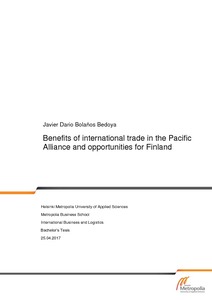Benefits of international trade in the Pacific Alliance and opportunities for Finland
Bolaños Bedoya, Javier (2018)
Bolaños Bedoya, Javier
Metropolia Ammattikorkeakoulu
2018
All rights reserved
Julkaisun pysyvä osoite on
https://urn.fi/URN:NBN:fi:amk-201805219325
https://urn.fi/URN:NBN:fi:amk-201805219325
Tiivistelmä
Since the creation of the Pacific Alliance, this has received great international attention due its fast dynamics and positive development. Its economic performance has been higher than other important economic blocs of the world in the last years. This thesis is focused on providing fundamental overview, developing the steps of a theoretical analysis of other studies and sources to extend the understanding of what is the Pacific Alliance, its progress in different areas and the projected economic and social effects for the state members. This is a secondary research based on different statistical data and other econometric studies attempting to recognize the benefits developed or expected for the countries of the Alliance (Chile, Colombia, Mexico and Peru).
Further description and analysis of trade liberalization theories is used to understand the academic support for this regional project that appears at a time when large economies like the United States, is making significant changes in the application of liberal measures, opting for more conservative policies.
The position of Finland related to the Pacific Alliance is analysed identifying the benefits this country has for being an Observer State and recognizing the economic sectors with more business opportunities and potential of growth in the Alliance.
It is concluded, among others, that Pacific Alliance appears as an incipient but right project for a region, progressing relatively fast by building political, normative and structural frame for the expansion of regional commerce and a vision towards the countries outside the Alliance. Previous studies on similar past experiences support this path even though the total effects on the economy are not yet visible. The perspectives are high and different sectors have possibilities of steady growth, especially due to excess of demand when implementing high standards in logistic infrastructure and due the natural development of the economies. Some productive sectors of the Finnish economy are identified as having a high potential for business opportunities and for becoming in effective providers (i.e. in education, technology, bio economic development) for different countries of the Alliance.
Further description and analysis of trade liberalization theories is used to understand the academic support for this regional project that appears at a time when large economies like the United States, is making significant changes in the application of liberal measures, opting for more conservative policies.
The position of Finland related to the Pacific Alliance is analysed identifying the benefits this country has for being an Observer State and recognizing the economic sectors with more business opportunities and potential of growth in the Alliance.
It is concluded, among others, that Pacific Alliance appears as an incipient but right project for a region, progressing relatively fast by building political, normative and structural frame for the expansion of regional commerce and a vision towards the countries outside the Alliance. Previous studies on similar past experiences support this path even though the total effects on the economy are not yet visible. The perspectives are high and different sectors have possibilities of steady growth, especially due to excess of demand when implementing high standards in logistic infrastructure and due the natural development of the economies. Some productive sectors of the Finnish economy are identified as having a high potential for business opportunities and for becoming in effective providers (i.e. in education, technology, bio economic development) for different countries of the Alliance.
